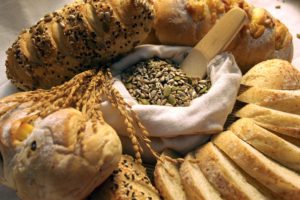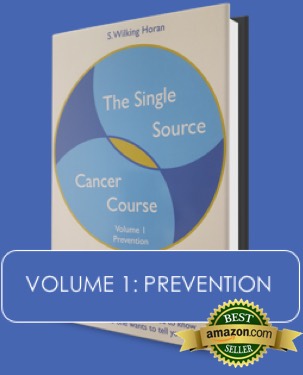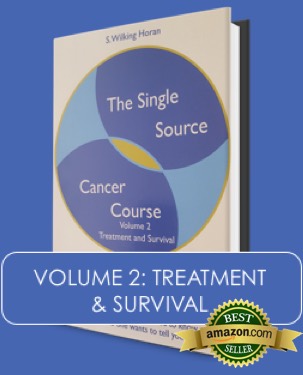 THE CANCER – CARB CONNECTION
THE CANCER – CARB CONNECTION
Welcome everyone to another What’s on the #Menu Monday. It’s April already and with Summer right around the corner our thoughts at this time of year often turn to losing weight and getting in shape. And, of course, it’s that time of year when we re-evaluate our diets and eating habits with the intent of improving both.
Now, we’ve known for years that a diet heavy in carbohydrates is not really the best way to support our bodies and immune systems. We know certain carbs in excess amounts can interfere with our digestion, our circulation and our desire to lose and keep a healthy weight.
But, gosh! Now it appears that carbohydrates may be linked to the development of certain cancers. Specifically, lung cancer. Is this something new? Or has this always been the case? Clearly, it’s time to discuss and clarify this recent news release from the University of Texas.
First, lung cancer is the leading cause of cancer deaths in the world. It may not be the most common among men or women – but, it is unfortunately the deadliest. And, the last thing any of us want to do is adopt a life style that encourages the development of this particular cancer.
We already know that we should eliminate the use of tobacco products. Smoking cigarettes, cigars, pipes & using chewing tobacco all greatly increase our risk of developing lung cancer. In addition, breathing in secondhand smoke is now thought to be just as great a risk as smoking firsthand. But, what about eating a plain baked potato? Or, enjoying a Sunday morning bagel? Do we have to worry about this as well when assessing our risk for lung cancer? Could these foods actually be worse for us than smoking cigarettes?
Kind of. Maybe. You see, it all depends on the Glycemic Index – or GI. Researchers at the University of Texas compared 2,000 people with lung cancer to 2,500 people without lung cancer. They found overall that non-smokers whose diets had a high glycemic index shared a risk for lung cancer that was 49 percent higher than non-smokers with diets of a low glycemic index. In other words, non-smoking high glycemics were two times more likely to develop lung cancer than non-smoking low glycemics. Moreover, among smoking high glycemics the risk only increased by 31 percent.
Hmmm . . . Does this mean that the risk for the smoking high glycemics was already elevated? And, therefore, it only rose an additional 31 percent because of diet? Because clearly, smokers and non-smokers didn’t start with a level playing field to begin with. Did they? Does this have to do with the quality or the quantity of carbs consumed?
In any case, here’s what we need to know about the glycemic index. It measures the nutritional quality of carbohydrates by how quickly our blood sugar levels rise following a meal. Foods that are easily and quickly converted into sugar and rush immediately into our bloodstream have a high glycemic index. These are often referred to as “bad carbs” and include white rice, white bread, pretzels, popcorn, white potatoes and – yes – bagels. On the other hand, foods that convert into sugar over time and slowly enter our bloodstream have a low glycemic index. Referred to as “good carbs” they include whole grain breads, pasta, bran and steel-cut oats.
So, we understand what the researchers found. But, the question remains, “Why?” Why do high glycemic carbs appear to be linked to lung cancer? Why do they seem to increase our risk for the disease? What is it that makes high glycemic carbs a dangerous risk for lung cancer specifically?
Well, we know that certain body cells are vulnerable to certain factors. Skin cells are vulnerable to the UV rays of the sun. Esophageal cells are vulnerable to harsh alcohols. Perhaps, the cells that comprise the lungs are simply more vulnerable to sugars and sugar rushes? Perhaps, these tissues are less able to absorb and withstand the effects of sugar than other body tissues?
Frankly, in my opinion studies that leave us with more questions than answers are great. They encourage us to conduct more research. They force us to think outside the box. And, they allow us the freedom to explore new avenues of thought and introspection.
But, here’s what we can take away from this information. High glycemic carbs aren’t really good for us. They slow our metabolism. They clog our digestive tract. They can leave us feeling tired and fatigued. They add little nutritional value to our diet. And, they just might increase our risk for lung cancer.
Knowing this, let’s try to exercise a little common sense. If you love popcorn – no need to kiss it goodbye – simply eat air-popped, low-fat and low-sodium brands once in a while. If you love baked or mashed potatoes – eat them – but only in moderation and in small portions. If you love bagels – don’t ban them from your diet – just limit your intake or try them in a whole grain version instead.
I always say, “Take it easy. Take it slow. Inch by inch it’s a cinch.” Over time, decrease the bad carbs and increase the good. And whether or not the carbs we consume increase our risk for lung cancer or not, we’ll at least be protecting our immune systems, our digestive tracts, our blood sugar levels and our healthy weights. All of which makes great “food for thought.”
With that, I thank you all again for joining me. Until next time stay in GOOD HEALTH and,
TAKE THE COURSE AND TAKE CHARGE!



Leave a Comment